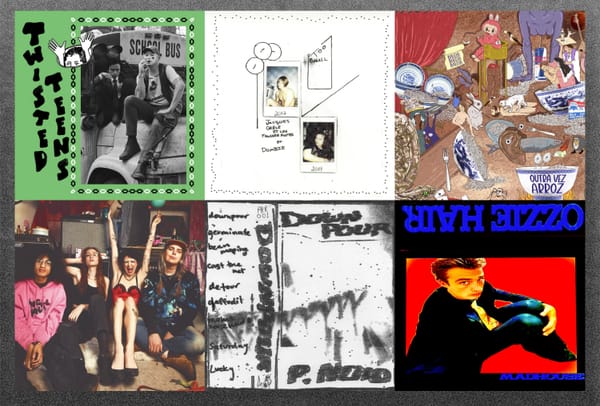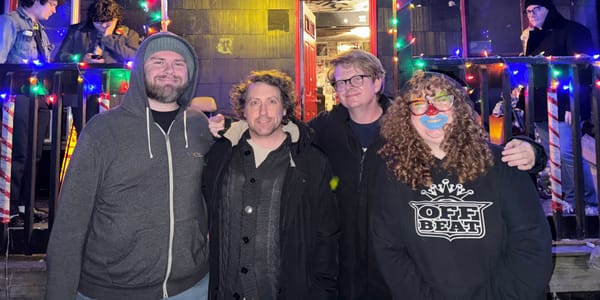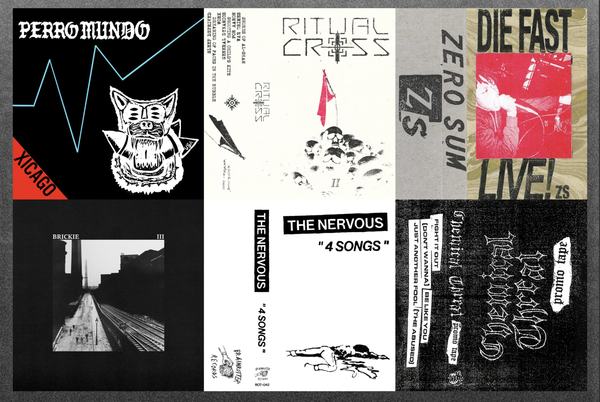dancer on taking swings and building their own momentum
The Glasgow post-punk quartet open up about the making of their debut album, Scotland’s local music scene, and more
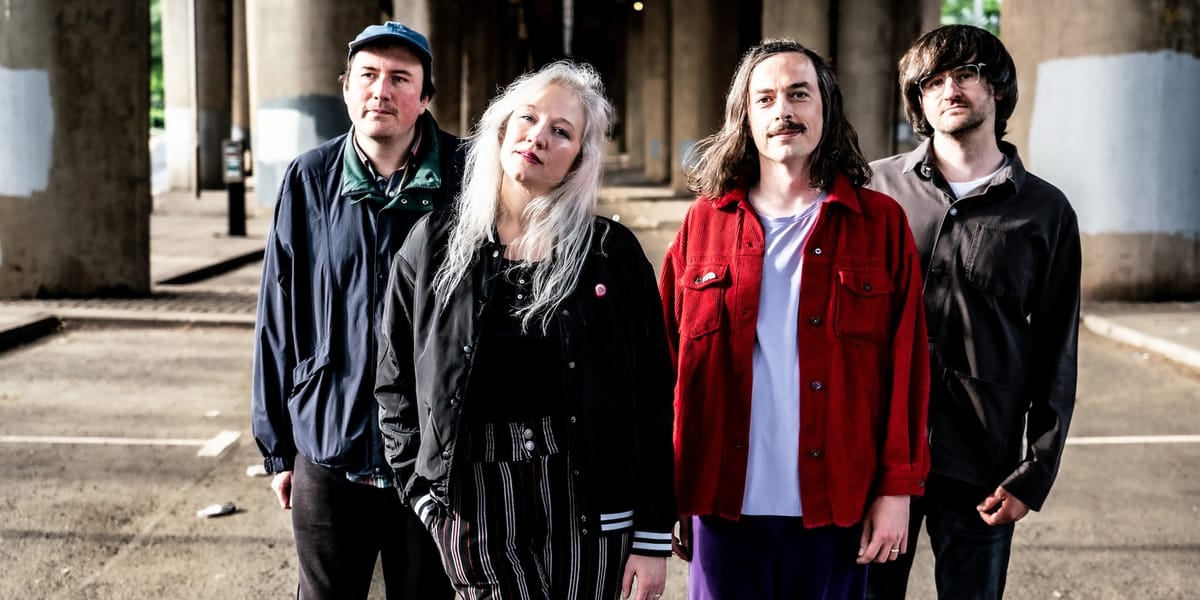
The first time I heard Dancer, I thought former members of Life Without Buildings started a new band. Both groups hail from Glasgow and have lead singers who grew up in the Bedfordshire county of England. But while Life Without Buildings found a deeply poetic way to slow down post-punk in their short tenure around the turn of the century, Dancer push their version of post-punk through art-rock inclinations and imperfect synths that emphasize the joy of getting weird with your friends. “Passionate Sunday” could pass for the Dismemberment Plan with its pitch-shifted math-rock guitar, and “Rein It In” summons the electric spunk of Sweeping Promises at their most spacious.
On their debut album, 10 Songs I Hate About You, all four members of Dancer write and perform like they’re stoked to be here. Their previous band, Order of the Toad, leaned on ‘60s psych-pop and stayed away from the experimentation they now indulge in with Dancer. Back then, frontperson Gemma Fleet played bass and sang in a way that never felt natural to her. “I think I was trying to emulate other singers, like Stevie Nicks or Grace Slick, because I wasn’t comfortable with myself in that band,” she says. Her bandmates weren’t doing what they wanted to either; guitarist Chris Taylor was behind the drum kit, and bassist Andrew Doig was stuck on guitar. So they decided to rotate instruments and start from scratch with a new band, bringing drummer Gavin Murdoch onboard to form Dancer in 2022.
As the name suggests, there’s an edge to Dancer’s upbeat songs that’s made for unconventional dance moves—something Fleet would, and does, encourage listeners to do while she writhes around onstage during shows. By ditching her bass and committing to being a lead singer, she freed herself up to move all over the stage live, pushing out more guttural notes with each lunge and dramatizing her exclamations with lungs working twice as hard. She admits she busts out shapes onstage like she’s in the last row of an aerobics class—the individual who starts to improvise when they can only make out 50% of the instructor’s moves. That energy brings out the punk side of Dancer: songs that are spiky and playful, like there’s some pent-up creativity bursting to get out.
That enthusiasm hasn’t slowed either. Dancer dropped their new full-length in March, and they’ve already followed it up with this month’s split with Portland new wave band Whisper Hiss. Plus, a new 7” with Shopping all-star R.aggs is due next month. Cracking open beers from their respective homes long after the sun had set in Glasgow, Fleet and Taylor joined me on a late-night Zoom call to discuss Dancer’s busy slate of new music, watching the spectacle that is the International Birdman contest, their local music scene in Scotland, and more.
You’ve said that your previous band, Order of the Toad, didn't allow for a lot of experimentation. How liberating was Dancer from the get-go in that regard, and did you all have a plan going into it as a result?
Chris Taylor: For me personally, I hadn't been just a guitarist in a band for about 10 years. I'd played drums, or played guitar and sang, or did electronic stuff. So I had 10 years of backed-up ideas that I could just throw out there, which was very, very liberating. Andrew, the bassist, did send out an email with song ideas and albums that were a direction he suggested we go in and—
Gemma Fleet: What? I didn’t get that!
Chris Taylor: Well, I ignored the list. [laughs] I looked down the list, recognized two things, and decided to do what I wanted to do. See, we all know each other so well and have worked together long enough to know how our ideas react off one another. So we just wanted to have fun, most of all. Technically there was a discussion, but Gemma wasn’t a part of it by the sounds of it.
Gemma Fleet: I want to see this list! But mainly I just knew I wanted to sing in my own voice in Dancer. I’ve spent a long time running from my voice and trying to be a fancy, nice-sounding singer, when actually that doesn't really convey my lyrics, which aren’t that pretty. I felt more free to be me. We naturally had a sound that we gravitated towards, which people have drawn similarities to bands like Life Without Buildings, who I really like. Maybe I’ve ripped them off a bit, but [Life Without Buildings singer Sue Tompkins] grew up near where I’m from, so it might just be because of the regional accent.
What was it about your voice that you didn’t like?
Gemma Fleet: I think it’s because it sounds a bit rough. I don’t know if that translates in the U.S., but we have a really, really harsh class system here. But then I didn’t want to sing in a posh voice either. There was something I wasn’t quite comfortable with, or didn’t have the confidence to sing in my own voice. In my very first band, back in 2004, I did sing in my own voice and I was confident. I don’t know what happened along the way. Did I lose it? I wanted to come across more as a musician, so I played instruments and sang and had something to prove instead of trying to really express my ideas.
Being a fellow Scottish band like Life Without Buildings, where do you feel like you land in Scotland’s musical lineage?
Gemma Fleet: Well we played with the guitarist from Life Without Buildings, who has a noise project with one of our friends. I asked him what he thought of the band and if we were ripping them off, and he said, “No, it’s nice to see it. It’s cool that the kids still know the influence.” And meanwhile I was thinking, Uh, you’re only a few years older than me. [laughs] I never saw Life Without Buildings play, but Andrew, our bass player, had. They just disbanded quite early. Three of us are English and we live in Glasgow, which is a similar thing with them. We were at the Glasgow School of Art which is a similarity, too. I reckon it’s those similarities that add to the sound.
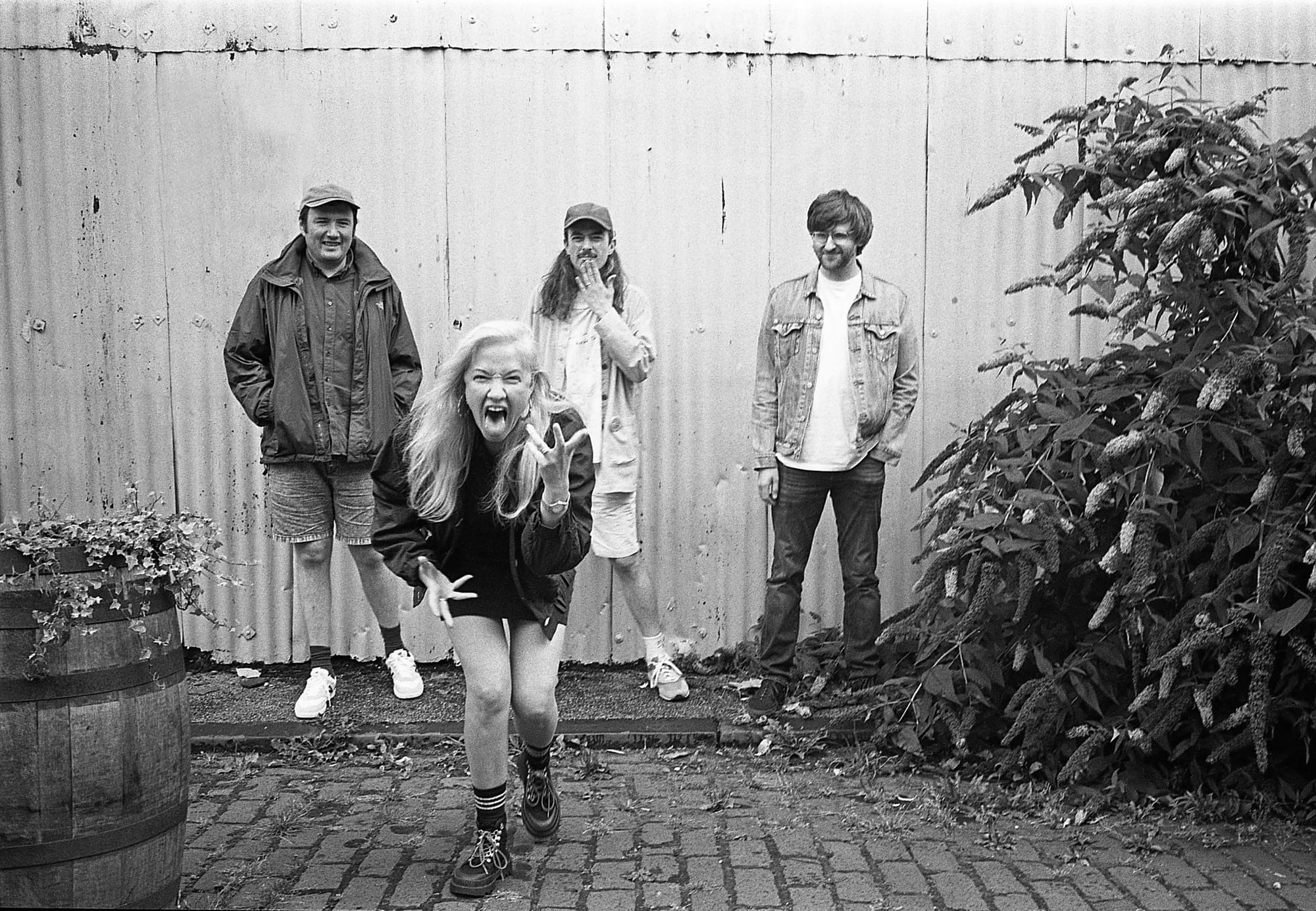
What is the current music scene like over there in Scotland right now?
Chris Taylor: There's a lot of good stuff in Glasgow at the moment. I keep banging on about a band called L who put a record out called Marilyn Monroe earlier in the year. There’s just nothing like it. I really enjoy when I can’t tell if something is really scary or really funny, and they’re great at that type of performance. It’s so heavy but also quite ridiculous. There’s also Coffin Mulch, so a lot of good heavy music in Glasgow right now. But there’s also the complete opposite side of the scale as well. There’s Apostille, of course. A lot of people talking about The Cords at the moment, who are these two young girls playing this jangly, Vaseline-style pop that’s really nice. There’s a big range of things and new bands popping up in Glasgow all the time.
Gemma Fleet: In Glasgow, there's so many venues and so many bands that you can't really keep up with what's going on every night. One of my favorites is Coolant, a duo that do this electric talky thing. There's definitely a lot of quite interesting stuff or music on the experimental side or, like Chris said, there’s a big heavy scene. We don’t have slews of dull indie bands like some places.
With 10 Songs I Hate About You being your full-length debut, did you feel like it was summarizing your band after a string of EPs?
Chris Taylor: In my mind, it actually feels more like the end of a phase. The first two tapes and the album have an overarching sound, especially being recorded in the same place, that we’re now expanding from. Because we got quite a nice reaction to the first tape and the second tape, the album had a lot of momentum behind it. There was more opportunity to sneak varied sounds in there.
Even though these songs are really fun, there’s a lot of earnestness to the lyrics about love or memories, things that make the listener pick up on the emotion Gemma is putting down. Where was your mind at while recording the vocals?
Gemma Fleet: Yeah, there’s quite a lot of sincerity in the love songs. Sometimes I feel embarrassed, like oh god, is this too emotional? But there’s stupid songs as well that are about whatever I’m feeling at a moment. For me, it’s important to tell a story. As for the actual physical recording of it, I record in the room when the band is playing because I don’t like to do it in the vocal booth solo. I need to feel that energy and togetherness when we’re playing.
Chris Taylor: You write so many songs as well, so you touch on a lot.
Gemma Fleet: Right. The album is almost old for us at this point because, since then, we’ve recorded a split, another single, and another album we’re in the midst of working on. I do love “When I Was a Teenage Horse” because that title was from a joke that Andrew told us. When he was young, he had the Hole single “Teenage Whore” and he told his mom that the lyrics were “When I was a teenage horse” so she wouldn’t get upset, which I thought was super funny.
Chris Taylor: I love “A Diagnosis.” You sound great on that one.
Also in the mix on a lot of these songs is Chris’ self-described “keys attached to guitar contraption.” It’s not a keytar, but an actual hybrid instrument you built yourself. How does that work?
Chris Taylor: This is one of the ideas I had for ages but couldn't use and was most excited about. It’s the opposite of hard work and hammers and nails. It’s a very small Casiotone Bank 100—basically the smallest keyboard imaginable, but still has a lot of sounds on it—which I attached to the guitar with velcro, so I can take it off and put it back on. Out of the headphone socket of the keyboard is a little external speaker that’s held in place by one of those arms you use to attach a phone to a desk, and that points to the pickup of the guitar. So I can just play through without having to make it a separate thing.
This sounds like a creature contraption from Pee-wee’s Playhouse.
Chris Taylor: That’s funny because one of my friends describes it as Pee-wee’s guitar. Clearly I’m very into that aesthetic. [laughs] There’s a game on Nintendo Switch called Trombone Champ and I like the idea of adding a freeform version of that, because then it basically becomes an air synth. All of this is ridiculous. I haven’t gotten around to it yet, but that’s the next goal.
Does that mean you end up playing both instruments at the same time?
Chris Taylor: There’s one point in the song “Change” where I’m playing both guitar and keys simultaneously, yeah. I don’t know why it seemed like the way to do it to me, but it did, so I built it. [laughs] Plus I’ve always had an affinity for the sound of a distorted keyboard, and this guarantees that distortion.
Gemma Fleet: Because it's going through the pickups of the guitar, so you don’t need an extra input or anything!
One of my favorite songs on this album is “International Birdman” because of how it starts sparse but builds over the runtime. What is that song about?
Gemma Fleet: The International Birdman Contest is the earliest memory I have. It was Christmas, and I was sitting down watching that contest on the television in the old, first house that I lived in. I must have been two or three years old. The story of the song is that somebody has prepared for the contest for many years—they've got their outfit made, they’re ready to jump off the pier, they’re focused—and then Covid happens and it gets canceled for three years.
Wait, I’ve never heard of this competition before. Are people making literal bird costumes and trying to fly off the edge of a pier?
Gemma Fleet: Yeah! So they make an outfit—like a little bird, or an airplane made out of cardboard boxes, people put a lot of effort into the wings—and they run off the pier so they glide to see how far they get.
Chris Taylor: They never get very far, but it’s about who can go the furthest. They just run. Sometimes people don’t even jump at the end of the pier, they just run as long as they can.
Gemma Fleet: They’re not allowed to use anything electronic, motors, stuff like that. I’ve only watched it on the telly. It’s like the Olympics of small-town England. We have loads of really weird games that are based on ancient traditions. Down in Cornwall, they set tar barrels alight and run them through the village, flaming hot. There’s ones where they roll cheese wheels down the hills, or you roll down the hill, too.
Every song starts with Gemma saying the song title into the microphone. It gives this whole album the feeling of watching a very intimate live set. Why did you keep those titles at the beginning of each song?
Chris Taylor: It’s how we made phone demos to remember the songs, but it just stayed. I can’t tell you why, but it just felt like it was a part of the songs now.
Gemma Fleet: We haven't continued to do it on these next releases, though. I think I got a bit bored of it. Maybe it’s because of how people consume music on Spotify and suddenly you have no idea what you’re listening to. Maybe on the next record I’ll introduce them with whole bios and background info. [laughs]
Between your new album, the split, and then this upcoming 7”, you’re really on a roll this year–both as a band and as collaborators branching outside of your scene. It’s exciting to watch it snowball.
Gemma Fleet: I think we just realized you can’t just sit around and wait for people to discover you. Reach out, travel, meet people, do what you can. Sometimes you can feel like making music is a bit desperate, so you’ve got to keep that community going. We’re lucky that we’ve connected with people, not just in our own city, but outside of it as well. I sound like Jerry Springer at the end now, don’t I? [laughs] Like I can give advice to people about how to do a band? I’m from a generation where listening to music was very curated, whether it was by people in charge of the radio or music magazines, but now everyone’s listening experience is completely unique. That’s great because it means what you listen to is no longer dictated by one guy at NME. Our sense of community has changed with that, too. Just because you’re a post-punk band doesn’t mean you can only play with or be friends with other post-punk bands. You can build a lineup with really different bands.
Chris Taylor: Definitely. It’s wonderful getting to do more and try more. And to think so much of this wouldn’t have happened if we hadn’t all been friendly in our community or Andrew hadn’t reached out to Meritorio Records or we didn’t put ourselves out there. You just gotta take that swing.

